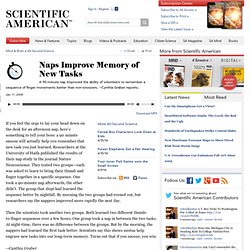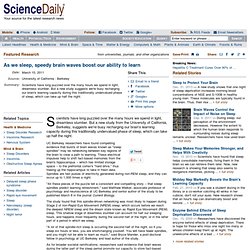

Good sleep, good learning, good life. Foreword It is everyone's dream to wake up fresh, happy, and ready for action on a daily basis.

Sadly, in the modern world, only a small minority lives that dream. Yet the dream is within reach for most healthy people given: a bit of knowledge, and a readiness to make some lifestyle sacrifice. I hope that this article compiles all the basic ingredients of knowledge that are helpful in accomplishing refreshing sleep. This article was originally written a decade ago. This article is a compilation of the most important and the most interesting things about the biology of sleep. Since writing the original Good sleep, good learning, good life, tremendous progress has been made in the science of sleep. As the article grew to be insanely long, you may wish to begin with the summary at the bottom of the article.
Notes Incremental writing: Due to the size of the material, this article was written using a technique called incremental writing. Importance of sleep Why understanding sleep is important? Scientific American: Naps Improve Memory of New Tasks. If you feel the urge to lay your head down on the desk for an afternoon nap, here’s something to tell your boss: a 90 minute snooze will actually help you remember that new task you just learned.

Researchers at the University of Haifa published the results of their nap study in the journal Nature Neuroscience. They tested two groups—each was asked to learn to bring their thumb and finger together in a specific sequence. One took a 90-minute nap afterwards, the other didn’t. The group that slept had learned the sequence better by nightfall. By morning the two groups had evened out, but researchers say the nappers improved more rapidly the next day. As we sleep, speedy brain waves boost our ability to learn. Scientists have long puzzled over the many hours we spend in light, dreamless slumber.

But a new study from the University of California, Berkeley, suggests we're busy recharging our brain's learning capacity during this traditionally undervalued phase of sleep, which can take up half the night. UC Berkeley researchers have found compelling evidence that bursts of brain waves known as "sleep spindles" may be networking between key regions of the brain to clear a path to learning. These electrical impulses help to shift fact-based memories from the brain's hippocampus -- which has limited storage space -- to the prefrontal cortex's "hard drive," thus freeing up the hippocampus to take in fresh data.
Spindles are fast pulses of electricity generated during non-REM sleep, and they can occur up to 1,000 times a night. "A lot of that spindle-rich sleep is occurring the second half of the night, so if you sleep six hours or less, you are shortchanging yourself. An afternoon nap markedly boosts the brain’s learning capacity.
If you see a student dozing in the library or a co-worker catching 40 winks in her cubicle, don’t roll your eyes.

New research from the University of California, Berkeley, shows that an hour’s nap can dramatically boost and restore your brain power. Indeed, the findings suggest that a biphasic sleep schedule not only refreshes the mind, but can make you smarter. Students who napped (green column) did markedly better in memorizing tests than their no-nap counterparts. (Courtesy of Matthew Walker) Conversely, the more hours we spend awake, the more sluggish our minds become, according to the findings. “Sleep not only rights the wrong of prolonged wakefulness but, at a neurocognitive level, it moves you beyond where you were before you took a nap,” said Matthew Walker, an assistant professor of psychology at UC Berkeley and the lead investigator of these studies. In the recent UC Berkeley sleep study, 39 healthy young adults were divided into two groups — nap and no-nap.
Guus Pijpers, Slaap je Slim deel 2. Slaap je slim. Walvissen en dolfijnen zijn zoogdieren, net als wij.

Maar in tegenstelling tot de mens kunnen zij een half uur onder water blijven zonder zuurstof in te nemen. Daarvoor moeten zij bewust ademen. Om bewust te ademen moeten ze wakker zijn. Hoe doen ze dat? De natuur heeft er een schitterende oplossing voor bedacht. Slaap er eens een nachtje over, zeggen we vaak. Wanneer we slapen, verliezen we het bewustzijn. Wil je informatie beter en slimmer onthouden, probeer dan voldoende te slapen. Houd zoveel mogelijk vaste tijden aan voor het opstaan en naar bed gaan.Dutjes overdag moeten kort zijn.Matig het gebruik van koffie en alcohol en andere verslavende genotsmiddelen.Het is ontspannend voor het slapen gaan te lezen.Vermijd alle spanningen voor het slapengaan. Maar laat je hersenen ’s nachts ook echt werken.